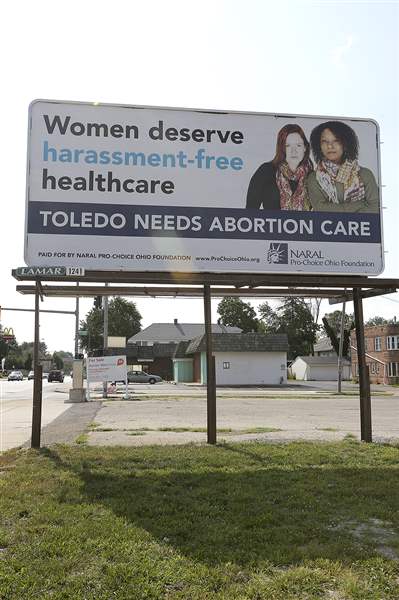
Northwest Ohio's last abortion clinic fights to stay open
State Supreme Court to hear case of Capital Care Network
8/14/2017
NARAL Pro-Choice Ohio Foundation has a billboard in Toledo, just in front of Capital Care Network-Toledo, which is fighting a state law that could force it to close.
THE BLADE/JETTA FRASER
Buy This Image
COLUMBUS — Northwest Ohio’s last abortion clinic will ask the Ohio Supreme Court next month to block the state’s attempts to shut it down despite what it claims have been its repeated attempts to comply with a regulatory framework that kept shifting under its feet.
The case, slated to be heard by the high court Sept. 12, is being closely watched as a test of regulatory and statutory restrictions Ohio has placed on abortion clinics.
Over the last few years, the number of clinics in Ohio has dropped from 16 to seven.
In advance of the court arguments, NARAL Pro-Choice Ohio Foundation funded, in support of the clinic, a billboard at North Haven Avenue and West Sylvania Avenue, near the Capital Care Network.
The state is trying to enforce its order that the clinic permanently close its doors because it has failed since 2013 to have a state-approved written agreement in place with a “local” hospital for patient transfers in case of medical emergency.
A brief filed by Cincinnati attorney Jennifer Branch on behalf of the clinic argues that the closing would force women from northwest Ohio to travel farther to access abortions.
“She would be forced to travel to a facility in Columbus (300 miles roundtrip) or Cleveland (240 miles roundtrip),” the sign reads. “Increased travel distances can pose a serious burden, particularly for poor, rural, or disadvantaged women.”
“These challenges are exacerbated by Ohio’s mandatory delay law for abortion, which forces patients to make the round-trip — and miss work, lose wages, and pay for transportation and child care — at least twice,” the brief adds.
Lucas County Common Pleas Court struck down a state Department of Health’s shutdown order to the clinic on grounds that Ohio’s restrictions were unconstitutionally folded into the state budget along with thousands of other provisions. It also found the state had unconstitutionally delegated state responsibility to hospitals and doctors.
When the state appealed, the 6th District Court of Appeals upheld the lower decision and added a third reason: the restrictions unconstitutionally imposed an undue burden on the ability of women to access abortion, an issue the state argues was never raised at the lower court level.
The state maintains that the rulings, if allowed to stand, would affect far more than abortion clinics because most of the restrictions also apply to dental, eye, and other outpatient surgical facilities.
“Its general reasoning threatens countless other Ohio laws,” reads the brief filed by Attorney General Mike DeWine in defense of the law. “The delegation view says that the State cannot make its own licensing decisions depend upon an applicant’s meeting a condition that requires another party’s cooperation.
“That means that Ohio cannot require any ambulatory surgical facility to have a transfer agreement because, in any context, transfer agreements require cooperation with hospitals,” it wrote.
The original requirement that ambulatory surgical facilities had to enter written transfer agreements with hospitals as a condition of their licenses was enacted as a Department of Health regulation in 1996.
Capital Care reached an agreement with the University of Toledo Medical Center, the former Medical College of Ohio, but the hospital notified the clinic in 2013 that it would not renew it.
The clinic struggled to find another area hospital willing to take its place, particularly after the state cemented the department rule into state law, added the requirement that the agreement be with a “local” hospital, and then prohibited publicly funded hospitals like UTMC from participating if abortion is involved.
The Toledo clinic operated for months without an agreement and never sought a waiver of the requirement from the department. After unsuccessfully courting hospitals as far away as Cleveland and Columbus, Capital Care reached a deal with the University of Michigan Health System, 52 miles away in Ann Arbor.
The Department of Health, however, rejected the deal.
“It cannot be that any hospital would do, even one as far away as California, because that would defeat the rule’s purpose,” reads the state’s brief. “Even an in-state distance from Cleveland to Cincinnati would be too much.
“... The court should find that the director acted in accordance with law, and based on reliable, probative, and substantial evidence, when finding that the 52-mile distance from Toledo to Ann Arbor was too far.”
Lawmakers subsequently amended state law to define a “local” hospital as one within 30 miles, in accordance with the department’s prior interpretation.
“At the end of the state budget process Ohio legislators buried controversial anti-abortion provisions in the several thousand pages of a budget bill that was sure to pass,” the clinic’s brief reads. “The written transfer agreement provisions, which are inherently controversial and of significant constitutional import, were not debated and approved during a fair and open legislative process.”
Contact Jim Provance at jprovance@theblade.com or 614-221-0496.